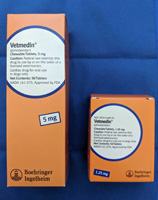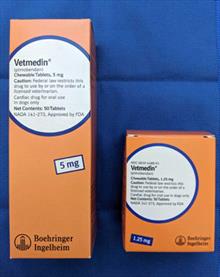!This story has an important update

Vetmedin 288

Photo courtesy of Dr. John Daugherty
Boehringer Ingelheim Animal Health is rationing Vetmedin after a stall in production due to a paperwork problem between the drugmaker's manufacturing facility and authorities in Mexico, company officials say.
A "document issue" is to blame for the supply interruption of Vetmedin (pimobendan), a life-extending cardiac medication for dogs with heart disease, and some dosage quantities of the nonsteroidal anti-inflammatory drug Metacam (meloxicam).
Heidi De Wit-Sommerfeld, head of U.S. communications for Boehringer Ingelheim Animal Health, explained Thursday in an interview with the VIN News Service that production is stalled at the company's manufacturing site in Mexico. The problem, she said, stems from a paperwork snag with the Comisión Federal para la Protección contra Riesgos Sanitarios. In English, that's the Federal Commission for the Protection Against Sanitary Risk.
Headquartered in Mexico City, the agency is responsible for regulating food safety, pharmaceutical drugs, medical devices and environmental protection. VIN News could not reach Mexican authorities to verify the problem with the BI manufacturing site.
De Wit-Sommerfeld said only that the issue involves paperwork compliance.
"This is not a capacity or quality issue," she said. "Our paperwork is filed. We are working hard and waiting for a response from the authorities."
In a "Dear Doctor" letter dated Sept. 3, Randolph Legg, BI head of Pet Vet Business, warned veterinarians of imminent shortages of Metacam concentrations of 0.5mg/ml 30ml and 1.5mg/ml 32ml and Vetmedin.
"We ask that you not start any new patients on Vetmedin until the supply situation is resolved," the letter stated. As far as Metacam is concerned, BI suggests that veterinarians begin switching customers to different appropriate strengths or consider potential NSAID alternatives.
Legg noted that BI product on the market is safe to use. "…This is not a quality-related issue," he stated.
But it is a serious one, veterinarians say. While U.S. Food and Drug Administration-approved NSAID alternatives to Metacam exist, that's not the case for Vetmedin. Its active ingredient, pimobendan, is the first drug in a class of heart medications called inodilators. It's used to treat heart failure due to mitral regurgitation and dilated cardiomyopathy, or DCM. In rare cases, it's also prescribed off-label for cats with heart conditions.
Pimobendan does two things to help the heart pump more efficiently: It opens blood vessels that take in blood from the heart, lessening its workload, and increases the strength of heart-muscle contractions, explained Dr. Mark Rishniw, a veterinary cardiologist and consultant for the Veterinary Information Network, an online community for the profession and parent of VIN News.
In a client handout, he wrote: "Improvements in the heart function while on pimobendan have been seen within one week of starting to take the medication, and some dogs continue to show improvement over several weeks. Many owners report an improvement in their pet's quality of life and well-being. Dogs who show improvement on it will likely remain on pimobendan for the rest of their lives."
Pimobendan preparations can be made-to-order by several compounding pharmacies; however, their efficacy has not been studied to any great extent.
Vetmedin is important to animal health, and that's why it is being rationed, De Wit-Sommerfeld said. "If we don't hear back [from Mexican authorities], we could run into shortages very quickly," she said. "We want to manage what we have."
Practitioners have shared their frustrations on VIN, noting that they're having trouble stocking the drug. BI officials have stated that they will "allocate" Vetmedin as supplies permit but are vague about how that will be done. "We will be reaching out to customers next week with regards to their allocations," De Wit-Sommerfeld said by email Friday. "Until we know more, we have to carefully manage our limited supply."
Pet owners have turned to social media to share their concerns. So have veterinary practices.
"Vetmedin back order alert," the Easton Animal Hospital in Easton, Pennsylvania, warned on its Facebook page. "Please note, if your pet takes the heart medication Vetmedin (pimobendan) it is short supply from the manufacturer. We do have some here and when it becomes unavailable from the manufacturer, we have compounding pharmacies that will help. Due to the shortage it may take a few days to accommodate a refill request, so please plan accordingly."
This isn't the first time Vetmedin suddenly has become scarce since the FDA approved it in April 2007 for use in dogs. A shortage occurred last year due to a capacity issue at the manufacturing site, De Wit-Sommerfeld said.
Out of frustration and concern, the owner of a dog named Lucca started an online petition with a message for BI Chief Executive Officer Wolfgang Baiker. "There is a consistent backorder of the crucial life-saving drug Vetmedin. This drug is essential to preventing heart failure in dogs. We must absolutely have an adequate supply."
Activity on the petition has ramped up in recent days, approaching 2,000 signatures.
FDA's role
If supply troubles continue long enough, the FDA Center for Veterinary Medicine can get involved. The agency can play a role in helping to alleviate or prevent drug shortages in situations when they involve medically necessary drug products.
The FDA considers a product to be medically necessary when no alternatives to it exist, and it's used to treat or prevent a serious animal disease or condition, or it is needed to ensure the availability of safe food products of animal origin.
Asked whether Vetmedin meets that definition, agency spokesperson Juli Putnam responded that "FDA CVM is currently gathering all available information to determine if Vetmedin is considered to be a medically necessary veterinary product."
Update: BI's manufacturing site in Mexico has been cleared to resume production of Vetmedin and other animal health products, as of Oct. 4. Officials anticipate that supplies will normalize soon.